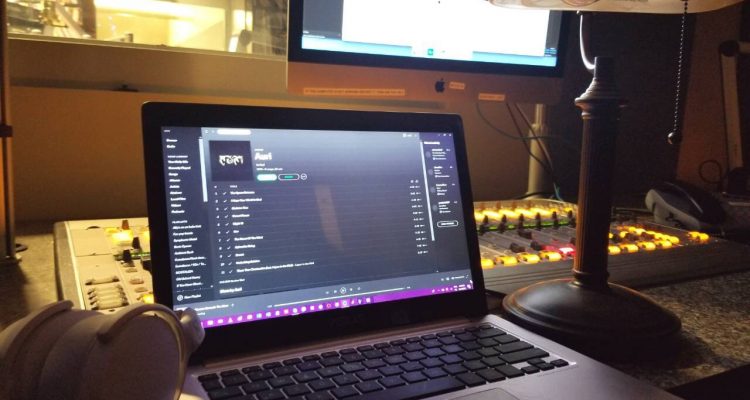By Ally Urban
What happens when you put together Tuomas Holopainen and Troy Donockley of Nightwish, as well as Finnish pop artist Johanna Kurkela (who also happens to be Holopainen’s wife)? Auri, of course! This side-project-turned-band released their self-titled debut album on Friday, March 23, under the Nuclear Blast record label.
FaceCulture, a YouTube channel dedicated to conducting interviews with various artists, published a two-part interview with Holopainen, Kurkela and Donockley on March 19― just a few days before the release of the album. The project itself was born in 2010, although Holopainen, Kurkela, and Donockley had worked on each other’s projects here and there throughout the years. At last, the trio felt like they needed to take their collaboration-game just a step further.
Things began to be put in motion when Donockley and Kurkela made a demo for “Aphrodite Rising” (track number eight on the album) in 2011, intending to use the song at some point. However, it was only recently that everyone involved in the project had been able to work on and record the album. Kurkela, who began releasing albums as early as 2004, has released four other albums since 2010. Nightwish had also been fairly busy in their own endeavours. In 2011, they released their seventh studio album, Imaginaerum, and subsequently embarked on the Imaginaerum World Tour in 2012. The band parted ways with vocalist Anette Olzon during the end of this tour, replacing her with current vocalist Floor Jansen. 2015 marked the release of Endless Forms Most Beautiful and the band toured in support of this album until 2016.
Thus, 2017 was the “golden ticket” year in terms of the trio being able to direct their focus on Auri. Through hard work and musical genius, this project turned into a full-fledged band; not just a one-time concept album like Holopainen’s The Life and Times of Scrooge.
The music itself is not inherently metal; in fact, it’s incredibly hard to categorise Auri under one genre because it’s a combination of so many glorious melodies, instrumentals, and lyrics. There are hints of Celtic sounds and Folk music throughout, but overall, the music feels powerfully ambient and atmospheric. The tracks range from calm and celestial to incredibly lively and upbeat. Across the board, there is an ever-present aura of mysticism and ethereality, giving the album its soul, and helping it ebb and flow through the ears of the listeners. I felt incredibly entranced when listening to this album for the first time, because it evoked such feelings of nostalgia and otherworldliness; time and space simply felt suspended. It’s exquisitely transcendental.
Although Tuomas and Troy do sing, Kurkela provides vocals for most of the tracks in the album. The instrumentation complements her voice extremely well. Kurkela also plays the viola, while Holopainen is on keys, and Donockley covers the rest of the string instruments, as well as the pipes.
As far as favourite songs go, I had quite a few, although I thoroughly enjoy the whole album; there’s not one bad song. The first track on the album is “The Space Between,” and it dives directly into a powerful drumline that gives way to Johanna’s elysian voice. The symphony of strings, keyboards and pipes is quite beautiful. “Skeleton Tree,” the third track on the album, is an instrumental. It’s a playful song, with Celtic and Folk melodies that give it an almost wild quality; only Kurkela’s flowing and inarticulate vocals can tame the instruments in this delightful composition. “Desert Flower,” the second longest song on the album, is an actual duet between Troy and Johanna. Both of their voices emit the same soft and gentle qualities, despite the fact that both musicians sing in different octaves. Additionally, the voices of the instruments seem to be in a duet of their own with the acoustic guitar staying in a lower octave and the viola tending to play in a higher one. Other tracks that stand out to me are “Night 13” and “Aphrodite Rising.”
It would have been wonderful, though, for Holopainen and Donockley to sing main vocals on a few more songs rather than just providing backups. “Desert Flower” is a powerful track, and clearly demonstrates Donockley’s vocal capacities. Holopainen is also a solid vocalist. He provided all the male vocals for Nightwish’s first album, Angels Fall First released in 1996. I would be greatly interested in seeing if Auri could play around with the diversity of their voices a bit more on their future albums.
Nonetheless, Holopainen, Kurkela and Donockley have truly created something magical and spectacular. It’s definitely worth it to give this extraordinary album a listen; all the surreal melodies and poetic lyrics ultimately help create the phantasmagorical soundscape that is Auri.


